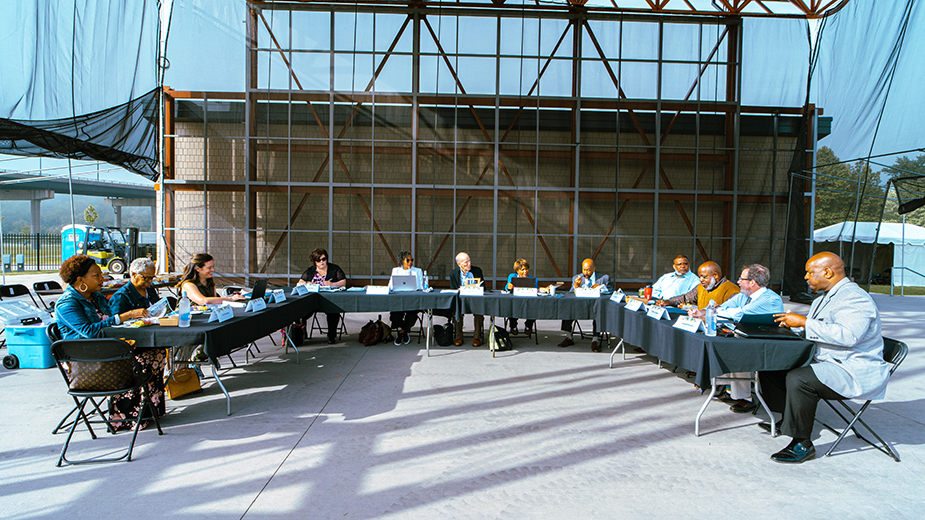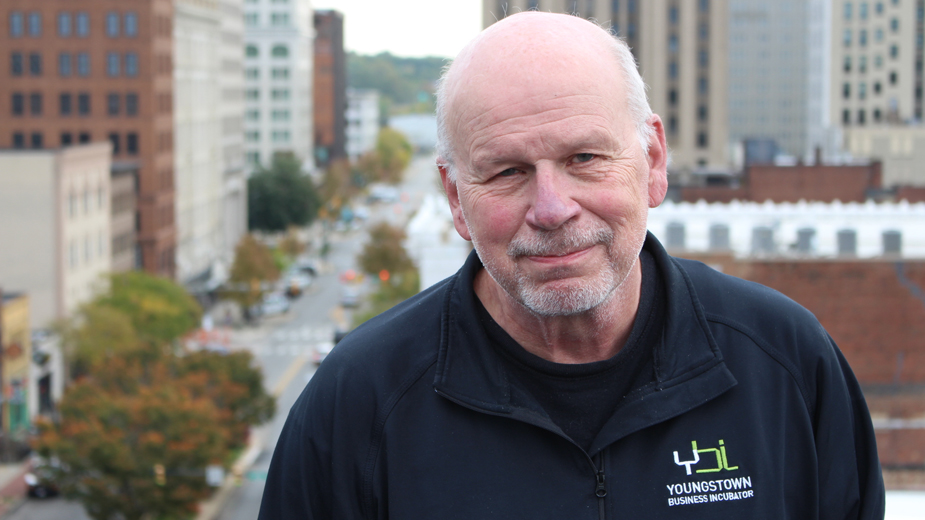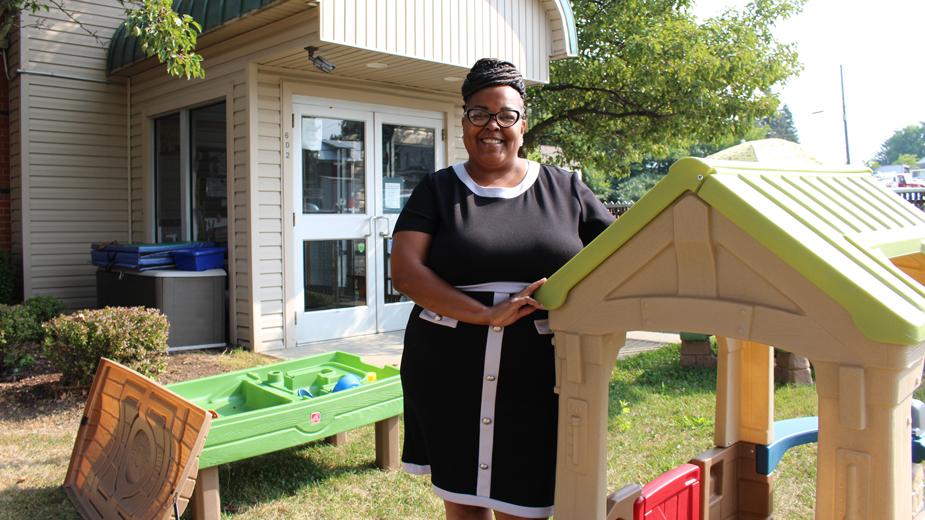Common Wealth Plants Sustainability on Elm Street
YOUNGSTOWN, Ohio — Shannon Blackshire had all but given up hope on making her passion into a business until a conversation with a neighbor changed everything.
Six years ago, Blackshire and her family moved from Lake County to the Wick Park neighborhood on the north side of Youngstown. As a mother of two and a proponent of what she calls “folk medicine,” she began researching natural, alternative ways to address various issues, from diaper rash to cuts, scrapes and bruises.
“It’s like going to grandma’s house,” she says. “You go to grandma’s house with a headache and she brings you a cup of peppermint tea. It’s the old way of taking care of ourselves and our families and our community.”
Blackshire earned a bachelor’s degree in complementary and alternative health and started blending balms and salves and making infused oils, as well as blends of tea and soap, she says. In 2011, at the encouragement of her husband, Jonathan, she started Her Primitive Ways Red Road Apothecary and began making products for sale at local farmers markets.
She ran her business out of her home, but wasn’t having the success she wanted. Discouraged, she was ready to close up shop a year ago. That’s when Pat Rosenthal talked to Blackshire about opening a wellness center on Elm Street.
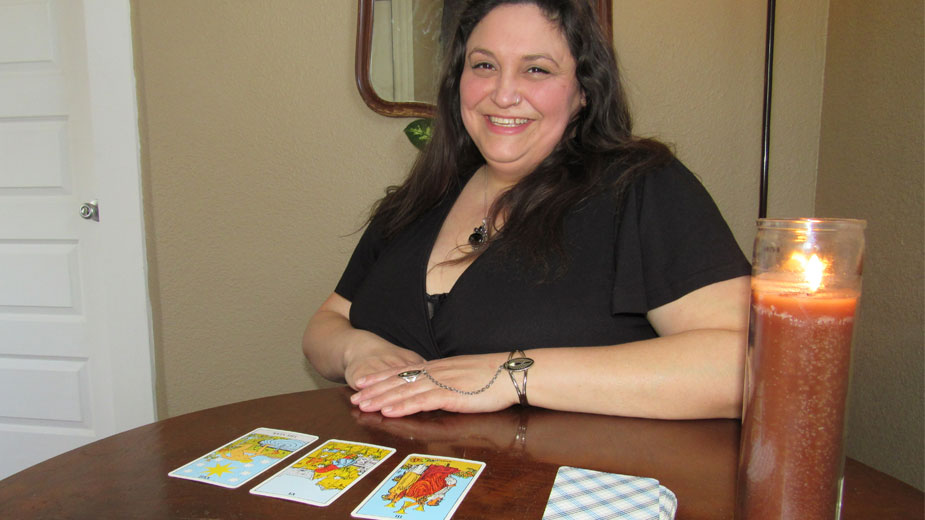
At Her Primitive Ways, Shannon Blackshire sells balms, salves, soaps and teas and offers other services, such as reiki sessions and tarot readings.
Rosenthal is executive director of Common Wealth Inc., a nonprofit focused on community development in the neighborhood. With the help of Rosenthal and Jim Converse, the sustainable development coordinator of the nonprofit, Blackshire moved Her Primitive Ways to a renovated house at 902 Elm St. in June.
Now with the space she needs, she sells her products, conducts workshops on natural wellness and offers reiki sessions and tarot readings. Business has been increasing as word spreads, she says.
“My goal is to offer affordable, sustainable practices for people to bring into their own homes to help support themselves and their family and community as well,” Blackshire says. “Pat and Jim were working on the goal of community with intention. Communities that help and support and nurture people for the greater good.”
The efforts of Common Wealth have given entrepreneurs such as Blackshire a chance to start businesses through a cooperative strategy with the intention of building up the Wick Park neighborhood, Rosenthal says.
In the last few years, long-standing businesses on Elm Street, such as Edward’s Flowers and Full Circle Florist, have been joined by Her Primitive Ways, Once Upon a Time Art Line, Culturehouse Coffee Co., Stitch Work by Janet and the Elm Street Diner.
At the heart of the revitalization efforts is the Common Wealth Kitchen Incubator at 907 Elm St., which has trained more than 130 entrepreneurs in the culinary industry, Rosenthal says.
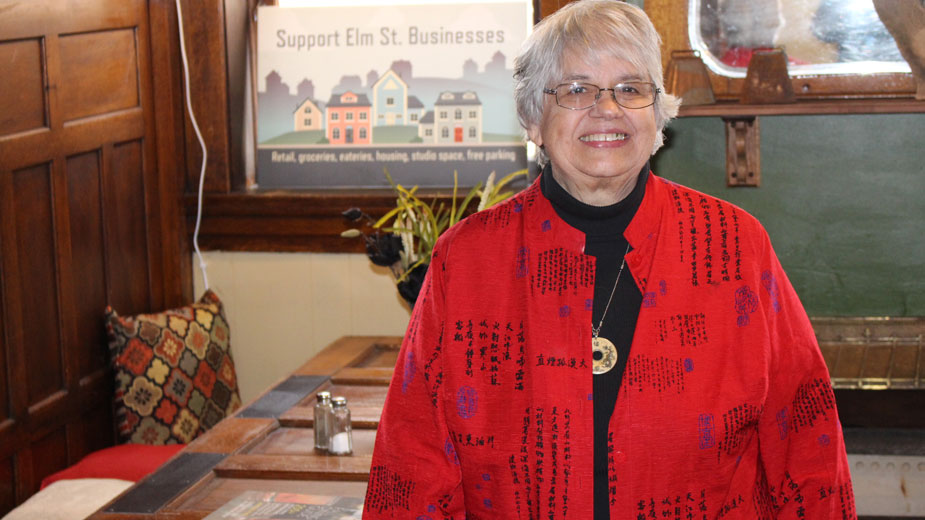
Common Wealth has spent $1.7 million in acquiring, renovating and maintaining the five buildings along the Elm Street corridor that house the new businesses, says Pat Rosenthal, executive director.
With the help of kitchen manager Sean Dougherty, who runs a business-planning course there, some of the graduates have gone on to open businesses in the region, while others have stayed at the incubator to make their products, Converse says.
“We’ve promoted from the outset the importance of local food as a way to capture dollars into the local economy,” he says. “It then recycles through the local community and helps spur development here.”
Incubator tenants have sold their products at farmers markets – including the Northside Farmers Market at 832 Elm St. – as well as in the grocery section of Cultivate: A Co-op Café, which operates in the same building as the incubator, Rosenthal notes.
“It’s been a way for people to be creative and to do what they love, and be able to enjoy income from it,” she says. “Which is kind of a core to community development from our standpoint.”
Janet Tartara jumped at the chance to open Stitch Work by Janet as part of the Elm Street Studios at 818 Elm St., which also houses Once Upon a Time.
Tartara, a retired nurse, opened her business in September. She sells handmade crocheted and embroidered items and offers other sewing services, including making clothes, wedding and bridesmaid dresses and alterations.
“This is something I wanted to do for a long time and it’s something that I really enjoy doing,” she says. “I sit here and I create all day long. I call this my happy place.”
Tartara is in the process of opening Your Space @ My Place, a consignment shop within her business where local artists and crafters can sell their wares, she says.
Elm Street Studios is upstairs from Culturehouse Coffee, which opened its storefront in November. Since then, Tartara has seen a gradual boost in business, she says.
“People don’t know we’re here. I didn’t know this place was here until I came to [Her Primitive Ways],” she says. “All of us here are pretty new at this. It’s been fun to watch it grow.”
Impact Maker
Abby Webb, AmeriCorps Vista volunteer, Common Wealth Inc.
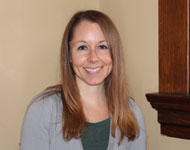
Webb Rallies Businesses to Grow on Elm Street
Growing up in Logan, Ohio, Abby Webb is familiar with what happens to a small town when manufacturing plants close. Around the same time the steel mills closed in Youngstown, factory jobs in Logan also disappeared, she says.
“When industry goes away, when jobs go away, there’s the scramble to try and figure out, ‘OK what’s next?’ ” she says. “What do we have to do now or what can we build on? What do we become from here?”
For Logan, tourism offered a way to keep the economy afloat, relying on destinations such as Hocking Hills State Park. And while Logan is much smaller than Youngstown – a population of some 7,000 compared to nearly 67,000 in Youngstown – Webb sees potential for her new home.
Webb met Melissa Miller and Jim Converse of Common Wealth Inc. while attending the Valley Health & Wellness Expo at the Covelli Center last year. She had just moved to the area after earning her master’s degree in public health from Drexel University in Philadelphia and was looking for work while her fiance started his residency at Mercy Health-Youngstown St. Elizabeth Boardman Hospital.
From Miller and Converse, Webb learned of the AmeriCorps Vista program and an internship available in June 2018. The focus of the internship is on economic development in the Elm Street corridor and sustainable-food initiatives, and Webb says she is able to apply practices she learned through the public-health degree program.
“Public health is a very broad field. It’s all-encompassing and it involves health care, education and the economy and the social landscape,” she says. “This is where I can serve the best and continue to develop the skills that I started developing in my public-health program.”
Webb accepted the internship and in July took over efforts to organize the Growing Elm Street initiative. The group consists of residents and business owners from the Wick Park neighborhood as well as Common Wealth staff. They meet monthly to discuss ways to advance the development of Elm Street and plan events to draw people to the neighborhood, she says.
On Dec. 1, the group held the inaugural Growing Elm Street Holiday Business Shuffle, a small-business shopping event during which all businesses on Elm Street participated, she says. Business owners created special offers and incentives that day, and shoppers received a punchcard they could take to each business and get punched if they spent money there.
“If they got a completed punch card, we did a free cookie in Cultivate Cafe,” she says.
Each business also donated an item from its store to a raffle basket. Tickets were sold at each business.
“For a couple weeks [of] planning, it was very well attended,” she says. “We had about 50 people.”
One of the business owners in Growing Elm Street is Ron Heinbaugh, who operates the Elm Street Diner, 832 Elm St. He lives in Cortland, but is looking to sell his house there and buy one down the street from his restaurant, “just to be part of the college community and the redevelopment here,” he says.
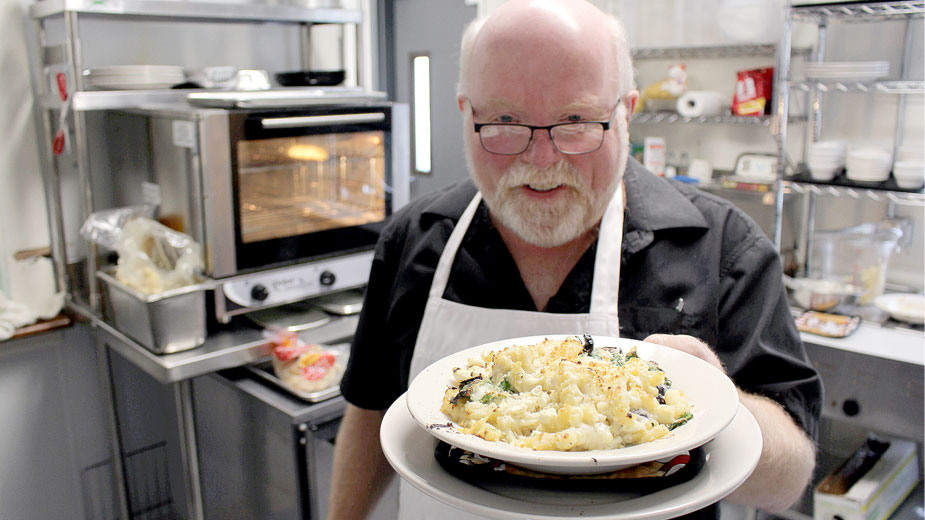
Ron Heinbaugh operates the Elm Street Diner at 832 Elm St.
Heinbaugh moved back to the Youngstown area after living 25 years in the Ohio City neighborhood of Cleveland. He owned four restaurants there and watched the neighborhood develop; houses there now sell for half a million dollars, he says. He sees the same potential on Elm Street.
“You can invest in a neighborhood, but it’s not the same as if you’re willing to live in it and work in it,” he says. “And that’s what this neighborhood really needs.”
Before moving to Cleveland, Heinbaugh lived just a few blocks from Elm Street in the 1970s and ’80s. He owned a few houses at the time, which have all been torn down, he says. He met Converse and Pat Rosenthal, the executive director of Common Wealth, at the Unitarian Universalist Church of Youngstown and decided to get back into the restaurant business as a way to contribute to the community, he says.
“I’m going to live here and it’s going to be my neighborhood,” he says.
The Elm Street Diner is one of four businesses to open since Webb joined Common Wealth, and she is working to develop marketing strategies to spread the word about Elm Street.
“It’s generated a lot of buzz in the neighborhood about what we’ve got available up here, what we’re doing,” Webb says.
“I really like tangibles and I like seeing the results of projects that I’ve worked on, and being able to see the changes in this neighborhood just from when I started,” she says. “And seeing the business owners coming together and thinking of themselves as a unified business district rather than just the individual businesses has been one of the things that I’ve enjoyed seeing the most.”
Since 2009, Common Wealth has spent $1.7 million in acquiring, renovating and maintaining the five buildings along the Elm Street corridor that house the new businesses, as well as the organization’s office at 832 Elm St., Rosenthal says. The nonprofit maintains an annual operating budget of about $800,000. It has benefited from volunteer work, grant funding, contracted services and apartment rentals, she notes.
Common Wealth leases 12 apartments on the block, typically upstairs from the ground-floor businesses, Converse says. Rent helps offset utility costs, maintenance and any mortgages, he says. The Kitchen Incubator alone has six apartments upstairs.
“Being able to leverage that helped us create the downstairs space,” Converse says.
Common Wealth was established to create jobs for people who were displaced from the closing of the steel mills. In 1987, Converse was hired as a project developer to create four prototypes of cooperative businesses to create jobs for the workers. That grew into a revolving loan fund that former Bishop James Malone of the Roman Catholic Diocese of Youngstown helped establish, included a five-year startup grant, he says.
The organization leveraged the fund to establish affordable housing in Youngstown and Campbell, “because so much of their housing funding had gone to various mob figures and others that the state basically refused to pay them anymore,” Converse asserts.
“We ended up working our tails off trying to do a lot of different housing,” he says. “Over the course of about 15 years, we built a portfolio of close to $50 million in various housing projects.”
These projects included tax credit-financed individual homes for residents, senior-citizen living centers and helping younger couples buy older homes, he says.
The Common Wealth mission was to save and remodel any houses it could because, at the time, sustainability meant sustaining the communities.
Investors who bought tax credits would get 10 years of write-downs on their taxes, Converse says.
For a house that cost $120,000 to refurbish, the organization received $60,000, with the rest funded by other financing mechanisms, such as bank loans. Leasing these houses paid down the debt owed, he continues. Lead paint remediation alone could cost up to $30,000, he adds.
“Our thought was, not everybody can afford to live in Boardman or Austintown or Liberty, which is where most of the middle-income people were going as they fled the city,” Converse says. “But we wanted to maintain a middle class and decent housing in the cities too.”
Common Wealth has sold between 30 and 40 houses, Rosenthal says. Houses are sold at their appraised value, usually around $40,000 to $50,000. Two houses on Baldwin Street were recently renovated for $140,000, one of which was appraised at $46,000. The tenant living there has expressed interest in buying it.
“So people have become homeowners who otherwise would never have been able to become homeowners,” Rosenthal says. “It’s also brought income to us.”
While appraised values may be less than the cost of the renovation, rental income helps to make up the difference, she says, as does the added value of having another homeowner in the neighborhood who patronizes its businesses.
For business owners like Her Primitive Ways’ Blackshire, it makes all the difference.
“There’s intention behind everything that we’re all doing,” she says. “It’s intention for community growth.”
This year, Common Wealth hopes to add a bicycle repair co-op, Converse says, and will continue to address food and urban farming development by ramping up its composting of food waste. The goal is to use the compost to improve the soil in the neighborhood.
“The soil in Youngstown is poor,” Converse says. “It’s soil that’s mostly clay, and in many cases it’s got other rubble from demolition mixed in with it.”
It would take about three or four years to get enough compost to revitalize an entire lot, he says. Common Wealth is seeking grants to fund those efforts, and earlier this month placed a new compost bin behind Cultivate.
With the closing of General Motors Lordstown, more people are recognizing the importance that food development has to the regional economy, according to Converse.
“If you put money into food and food-related development, the need for that’s not going to go away. The urban land is not going to go away,” he says. “We just need to get our activities better coordinated.”
CLICK HERE for a 3 Minutes With interview Jim Converse who discusses the role food has played in sustainable development in the Wick Park neighborhood.
How You Can Help
Community members can have a positive effect on Common Wealth Inc. by making a donation or volunteering their time.
Every donation to the tax-exempt organization is greatly appreciated and “very well spent” says its executive director, Pat Rosenthal. Donations help fund housing projects and other community-development efforts in the Wick Park neighborhood.
“We’re always chasing funds,” Rosenthal says. “We’ve never had a pipeline of money and it has been a challenge.”
To make a donation, contact Melissa Miller, resource manager at Common Wealth, at [email protected] or by calling 330 360 0648.
Opportunities to volunteer are also available, “particularly as we move into sustainable development as a focus,” Rosenthal says. As Common Wealth rolls out recycling and composting programs, there will be need for volunteers.
Other opportunities include gardening, water catchment and help with biodiversity in the community, she says, as well as Grow Elm Street events.
Pictured at top: Promoting the importance of local food nourishes the local economy, says Jim Converse of Common Wealth Inc.
Copyright 2024 The Business Journal, Youngstown, Ohio.
